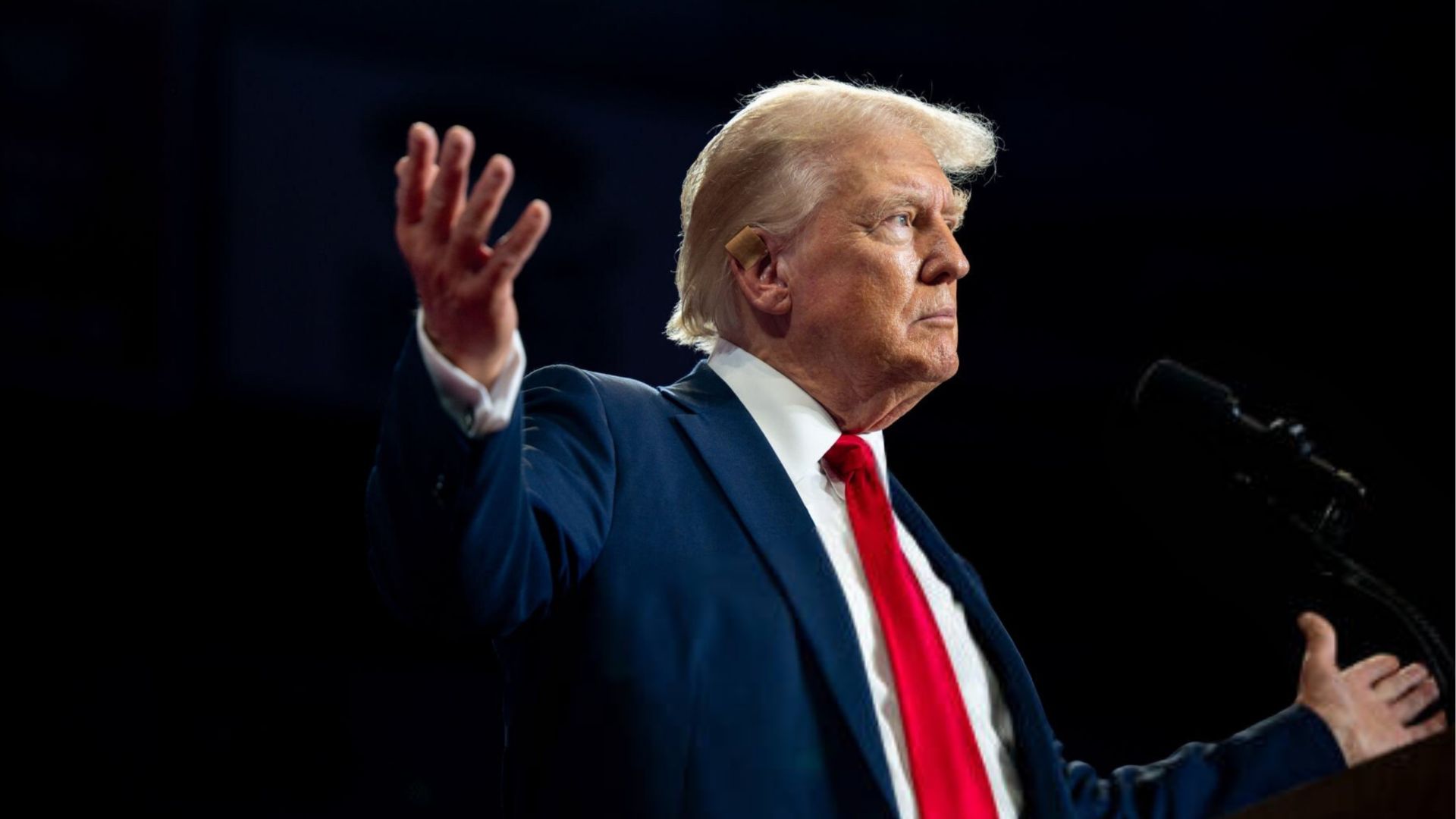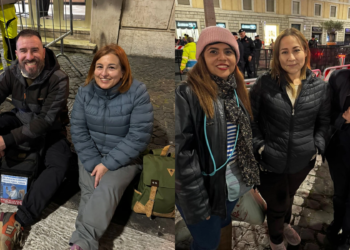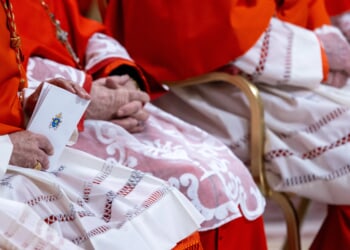
President Donald Trump confronted South African President Cyril Ramaphosa during a meeting at the White House on Wednesday over the rising number of attacks on white South African farmers and the country’s newly enacted land expropriation law, citing concerns about racially motivated violence and property seizures.
The discussion gained national attention after President Trump presented video footage showing South African political figures, including opposition leader Julius Malema, calling for violence against white farmers, also known as Afrikaners or Boers.
Trump said the footage illustrated why many South Africans are fleeing the country and seeking asylum in the United States.
Trump’s Sovereign Wealth Fund: What Could It Mean For Your Money?
“We have many people that feel they’re being persecuted, and they’re coming to the United States,” Trump said.
“People are fleeing South Africa for their own safety. Their land is being confiscated, and in many cases, they’re being killed.”
Although the South African government has consistently denied claims of “white genocide,” U.S. officials and human rights organizations have pointed to troubling data.
A 2021–2022 State Department report cited 748 farm attacks and over 100 murders, many involving white farmers.
This Could Be the Most Important Video Gun Owners Watch All Year
While some groups attribute the violence to general crime, others argue that the attacks are racially motivated.
Genocide Watch, a Washington-based NGO, stated that South Africa has one of the world’s highest murder rates and identified the failure to prosecute perpetrators in farm-related killings as contributing to a broader “culture of impunity.”
In its report, the group said white farmers are especially vulnerable due to government policies banning private firearm ownership and dismantling rural self-defense networks.
“White farmers are defenseless because South Africa outlawed private gun possession and disbanded the mutual protection cooperatives,” the organization wrote, adding that political leaders like Malema “encourage these murders.”
In a 2023 report, veteran journalist Geof Hill noted that while Afrikaners comprise roughly 8% of South Africa’s population, they account for just 2% of total murders.
The South African Police Service recorded nearly 20,000 murders between April and December 2024, but crime data is not broken down by race, complicating analysis.
Critics of Trump’s remarks focused on his use of the term “genocide,” with outlets such as Reuters and Al-Jazeera reporting that President Ramaphosa disputed the claim.
“If there was Afrikaner farmer genocide, I can bet you, these three gentlemen would not be here,” Ramaphosa said, referencing white South African golfers accompanying him.
President Trump and South African President Cyril Ramaphosa exchange on genocide.
Q: “What will it take for you to be convinced that there’s no white genocide in South Africa?”
Ramaphosa: “I can answer that for the president.”
Trump: “I’d rather have him answer.” pic.twitter.com/8v8hXFGmK0
— CSPAN (@cspan) May 21, 2025
Still, Trump’s administration has taken policy action in response.
H/T @libsoftiktok https://t.co/RXAAWyNdvO
— Western Lensman (@WesternLensman) May 22, 2025
In February, the president signed an executive order halting aid to South Africa and initiating a program to offer asylum to Afrikaner refugees.
The order described South Africa’s land seizure law, signed in January, as “government-sponsored race-based discrimination.”
The land reform legislation allows the government to confiscate private property without compensation under certain conditions deemed “just and equitable.”
The law replaces a 1975 provision that required payment to the landowner and aims to address racial disparities in land ownership that remain from the apartheid era.
White South Africans, though a minority, continue to own roughly 75% of all private land.
South Africa’s government dismissed Trump’s action as “politically motivated,” stating in a February release, “There are sufficient structures available within South Africa to address concerns of discrimination… these do not meet the threshold of persecution required under domestic and international refugee law.”
President Trump also raised concerns over South Africa’s foreign policy, criticizing the country for aligning with U.S. adversaries.
In recent years, South Africa has hosted joint naval drills with Russia, maintained economic ties with Iran, and publicly supported Hamas and Hezbollah—both designated terrorist organizations by the U.S. government.
After the October 7 Hamas attack on Israel, South Africa filed a case at the International Court of Justice accusing Israel of genocide in Gaza.
At Thursday’s State Department briefing, spokesperson Tammy Bruce said, “When you’re passing laws like that, that target a group ostensibly sending a message to the population that these people have a price to pay… combined with the chants to kill Boers… in addition to the association South Africa and its president have chosen to make, like with Iran… it creates a picture that is worthwhile to have a conversation in the Oval Office.”
The White House has not indicated whether further sanctions or diplomatic actions are being considered.
Connect with Vetted Off-Duty Cops to Instantly Fulfill Your Security Needs

![Trump's Tariffs Bring China to the Negotiating Table, Meetings in Switzerland [WATCH]](https://www.right2024.com/wp-content/uploads/2025/05/Trumps-Tariffs-Bring-China-to-the-Negotiating-Table-Meetings-in-750x375.jpg)



![CNN’s Jennings Roasts Biden's 'The View' Interview Defenders, Calls Out Coming Meltdown [WATCH]](https://www.right2024.com/wp-content/uploads/2025/04/Scott-Jennings-Wrecks-Former-Hillary-Spokesperson-with-One-Question-on-350x250.jpg)

![Stephen A. Smith Goes Ballistic on DeMS-13 Senator Van Hollen [WATCH]](https://www.right2024.com/wp-content/uploads/2025/05/Stephen-A-Smith-Goes-Ballistic-on-DeMS-13-Senator-Van-Hollen-350x250.jpg)

![Dem Rep Caught on Bodycam Physically Attacking Law Enforcement at ICE Detention Facility [WATCH]](https://www.right2024.com/wp-content/uploads/2025/05/Dem-Rep-Caught-on-Bodycam-Physically-Attacking-Law-Enforcement-at-350x250.jpg)
![Donald Trump Pardons ‘Century Men’ During West Point Commencement Speech [WATCH]](https://www.right2024.com/wp-content/uploads/2025/05/Donald-Trump-Pardons-‘Century-Men-During-West-Point-Commencement-Speech-350x250.jpg)
![Minnesota Officials Panicking Over Derek Chauvin Pardon Speculation, Potential Unrest [WATCH]](https://www.right2024.com/wp-content/uploads/2025/05/Minnesota-Officials-Panicking-Over-Derek-Chauvin-Pardon-Speculation-Potential-Unrest-350x250.jpg)





